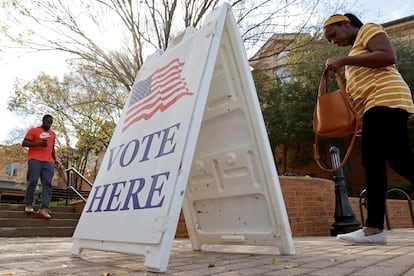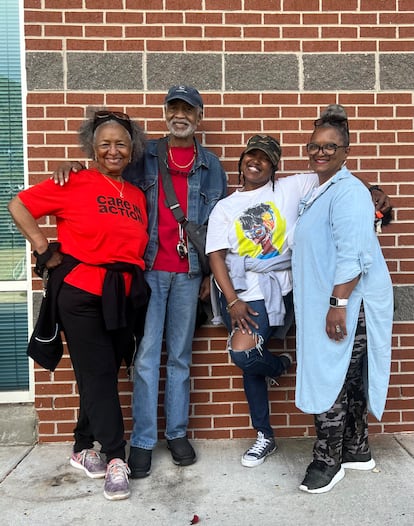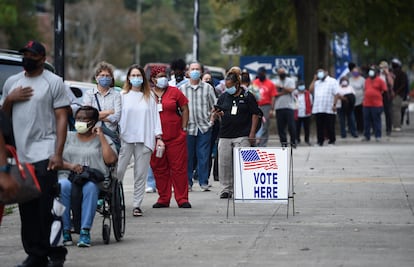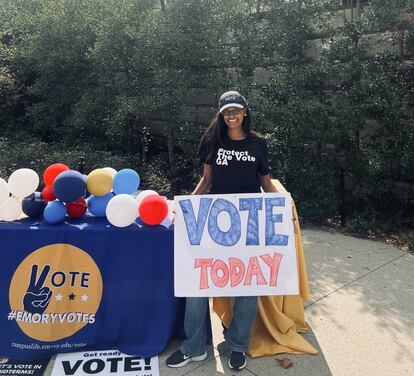‘It’s modern-day slavery’ – minorities in the American south battle voter suppression
Despite Republican constraints, early voting in Georgia breaks records while election deniers sow doubt in a state critical to the Democrats

Jasmine Bowles and her family like to vote early, preferably on the same day the polls open. So Jasmine, her mother and grandparents all went on October 17 to fulfill their civic duty at a sports center in Clayton County, south of Atlanta, in the battleground state of Georgia. This election was different for the Bowles family because Jasmine, an African American activist who works for an organization that defends the rights of domestic workers, was on the ballot. She is seeking re-election to her district’s school board in the November 8 midterm elections, when hundreds of local, regional and state offices, plus the entire House of Representatives and one-third of the Senate will be contested.

“It’s important to come early,” said Jasmine as she waited in line on an empty basketball court. As she left the polling station wearing her “I’m a Georgia voter, I secured my vote” sticker, Jasmine said she was glad to have spent an extra 30 minutes on the process. “I have a feeling turnout will be high, despite Republican attempts to suppress voters like us,” she said, referring to a 2021 state election law that tightens voting requirements and affects mostly minorities and the underprivileged. Those minorities, like Bowles, usually vote for the Democrats.
Voters started getting in line at 7am on the first day of early voting in a Dekalb County school and the half-dozen other voting centers around metropolitan Atlanta visited by EL PAÍS. Voters like delivery driver Marlon Peters, who didn’t want to wait until the last minute. Bowles was right about the high turnout – as of November 2, more than two million Georgians had voted early by mail or in person. This number was half a million higher than at the same point in the 2018 midterm elections, but 1.2 million below the 2020 presidential elections figure, which was an anomaly because 70% of the eligible voters cast their ballots early to avoid crowds in the midst of the pandemic.
The very high numbers of early voters in Georgia were decisive in Joe Biden’s 2020 victory over Donald Trump, who spent much of his presidential campaign warning that early voting was a Democratic ploy to steal the election. Trump lost Georgia despite his attempts to overturn the election results, and he still refuses to concede defeat even though his baseless allegations have been repeatedly refuted in court. Trump won only one of the 62 lawsuits he filed to challenge election results in various states, and the recount resulting from his sole legal victory did not affect Biden’s win in that state. Ongoing investigations are still looking into Trump’s infamous, hour-long phone call to Georgia Secretary of State Brad Raffensperger. In the damning recording of the call, Trump is heard telling Raffensperger, “What I want to do is this. I just want to find, uh, 11,780 votes, which is one more than [the 11,779 vote margin of defeat] we have, because we won the state.”

Raffensperger and Georgia Governor Brian Kemp, both Republicans who are seeking re-election this year, resisted Trump’s pressure in 2020, but months later, Kemp signed into law the game-changing Election Integrity Act of 2021. It’s the most notorious of the 42 election laws passed by 21 states since 2021 that make it harder for minorities to access the ballot box, according to the nonpartisan Brennan Center for Justice. Of those 42 laws, 33 are currently in effect for this year’s elections.
Martin Luther King country
Ricardo Ramirez, a Brennan Center advisor, bemoans all that’s going on in this state. “Georgia has an illustrious history of fighting for civil rights. It’s Martin Luther King country, and John Lewis’ home state [Lewis died in 2020 and his name is on the voting rights bill stalled in Congress]. Unfortunately, it has come to symbolize how radical conservatives are attacking the very heart of democracy in order to retain power in place where the demographics do not favor them.”
Georgia’s Election Integrity Act, which was unsuccessfully challenged by the US Department of Justice on civil rights grounds, shortens the timeframe for submitting mail-in ballots, which now must be accompanied by a printed or scanned copy of a valid identification document. It also reduces the hours and locations for dropping off ballots, which are now closed on Sunday. Lastly, the law notoriously makes it a crime to give food or drink to voters standing in line, ostensibly to prevent activists from influencing their decisions. On Election Day 2020, some voters stood in line for up to nine hours in Georgia’s most populous counties, which are also its most racially diverse and which voted overwhelmingly for Biden.

“Another terribly harmful aspect [of Georgia’s Election Integrity Act] is that it allows any citizen to challenge the legitimacy of other voters. So far, 80,000 complaints have been received,” said Xakota Espinoza of Fair Fight, at a rally in Atlanta for the organization’s founder, Democratic gubernatorial candidate Stacey Abrams. “The people making these challenges are usually people with ties to election deniers and conspiracy groups. About 90% of them are dismissed, but they waste the time of election officials, who are required to immediately investigate each case.”
Casting doubt on an imperfect process and consuming public resources might lead to mistakes that could be used by Republicans to challenge election results. Similar strategies have been employed in Texas, Michigan and Pennsylvania. Virginia created an election integrity unit to monitor the states electoral processes.
What was once a fairly uncontroversial election official job has now become a high-risk vocation in the United States due to a number of laws that mandate jail sentences for election officials who do something wrong. A national organization was even set up to provide election officials with free legal support in light of all the harassment and intimidation by professional politicians and conspiracy theorists like the people behind the 2,000 Mules documentary, who made baseless allegations about ballot box stuffing in Georgia.

The most visible champion of voter rights in Georgia is gubernatorial candidate Stacey Abrams, who is running behind incumbent Governor Brian Kemp, according to recent polls. Abrams was crucial in mobilizing the African American electorate in 2020 that turned out in large numbers for Biden. But her high profile could work against her, says Greg Bluestein, Georgia’s most well-known political journalist. The author of Flipped: How Georgia Turned Purple and Broke the Monopoly on Republican Power, told us in an interview that, “Voters on the other side resent Abrams for her many years of activism. She can always count on her base, but polls show that the economy is the biggest issue for 75% of Georgians (which includes many undecided voters). This isn’t her fault. Biden – and Abrams by association – are being blamed for inflation.”
Inspired by Abrams, several voting rights organizations have sprung up in Georgia since 2020. One such organization, Protect the Vote GA, is led by a young activist named Hannah Gebresilassie, who on the first day of early voting set up a table in Emory University to encourage her co-workers to vote. The Atlanta university is a community of 30,000 students, professors and staff. “A lot of people think there’s no more slavery, but that’s not true,” said Gebresilassie. “It’s a modern-day slavery that’s reflected in unemployment rates, disparate education levels and voter suppression. It all has to do with the imperfect foundation on which this country was built. And to change that, it’s critical that minority voting is not hindered.”

Georgia’s has become one of the main battlegrounds pitting voting rights activists like Gebresilassie against some of the most unrepentant election deniers in the country like Garland Favorito, who founded VoterGA 16 years ago. Favorito is a 75-year-old white man who on October 13 sat in an Atlanta-area courthouse awaiting the verdict on a lawsuit he filed to challenge the legality of the recount of more than 3,000 primary votes last May. During a court recess, Favorito said: “There were many, many problems again. In 2020, there were multiple cases of fraud and irregularities that could have affected the result. We believe there were tens of thousands of falsified ballots that we have not been allowed to verify.” So Biden didn’t win in Georgia? “It’s not just me making this claim,” said Favorito. “Georgia’s Senate Judiciary Committee has also said it – that election should never have been certified. But we don’t want to get stuck on the 2020 election results – we want to understand what happened to avoid a repeat. Yes, it has to be easy to vote, but also hard to cheat.”
🧐🧐🧐 SEE SOMETHING, SAY SOMETHING!
— Garland Favorito (@VoterGa) October 24, 2022
*** 2022 Election Hotline ***https://t.co/m0pkrk4aAY#voterga#auditganow#gapol pic.twitter.com/XFjYXtHZAj
Favorito vowed to remain vigilant during the three-week early voting period that ended on November 4, and which broke turnout records in Georgia and across the country. A recent Gallup poll estimated that 41% of eligible voters cast early ballots (up from 37% in 2018), 54% of them Democrats and 34% Republicans. In Georgia, rural counties like Glasscock turned out for Trump in 2020 – 89% of its nearly 3,000 residents voted for the former president, which roughly corresponds to the county’s white population. On a Saturday afternoon in this corner of the southeast – a landscape dotted by single-family homes, farm machinery and the occasional church – not a person was in sight. It was a marked contrast to the long lines of voters in the nine urban counties around Atlanta where half of the state’s voters live.
In just a few days, Georgians will see how the new election laws and extraordinarily high early voting (which has not always been a reliable indicator) will affect the outcome in their state, and what the 2020 election deniers will do if their candidates lose again. If either Raphael Warnock (D) and Herschel Walker (R) don’t win more than 50% of the vote, then this hotly contested Senate race will go to a runoff as it did two years ago, delaying Warnock’s eventual victory for 63 long days.
A problem that also affects Latino voters
Lourdes M. Rosado, president of New York-based Latino Justice, says that voter suppression is also an issue for the US Latino community. The 50-year-old organization has been working to ensure that election information and ballots are also offered in Spanish because according to Rosado, “If your primary language isn’t English, then not having translations is another form of suppression.”
Another challenge Latino Justice faces is motivating Latinos to participate in a democracy that does not always value them fairly. “We are almost 20% of the population, but we have much lower political representation at all levels – Congress, judges and prosecutors,” said Rosado. The organization is focusing on raising awareness among young Latinos under the age of 18 because they are the fastest-growing age group.
“The problem is that neither party has done a good job of talking about and addressing our problems,” said Rosado. “Latino voters feel that they’re being taken for granted, and they’re getting tired of that. The Democrats are regretting losing Latino voters, but the truth is that both parties only think about the Latino vote when it swings to the other side.”
Tu suscripción se está usando en otro dispositivo
¿Quieres añadir otro usuario a tu suscripción?
Si continúas leyendo en este dispositivo, no se podrá leer en el otro.
FlechaTu suscripción se está usando en otro dispositivo y solo puedes acceder a EL PAÍS desde un dispositivo a la vez.
Si quieres compartir tu cuenta, cambia tu suscripción a la modalidad Premium, así podrás añadir otro usuario. Cada uno accederá con su propia cuenta de email, lo que os permitirá personalizar vuestra experiencia en EL PAÍS.
¿Tienes una suscripción de empresa? Accede aquí para contratar más cuentas.
En el caso de no saber quién está usando tu cuenta, te recomendamos cambiar tu contraseña aquí.
Si decides continuar compartiendo tu cuenta, este mensaje se mostrará en tu dispositivo y en el de la otra persona que está usando tu cuenta de forma indefinida, afectando a tu experiencia de lectura. Puedes consultar aquí los términos y condiciones de la suscripción digital.









































